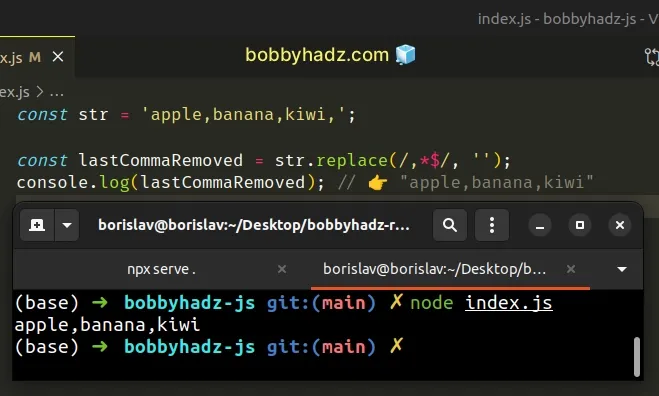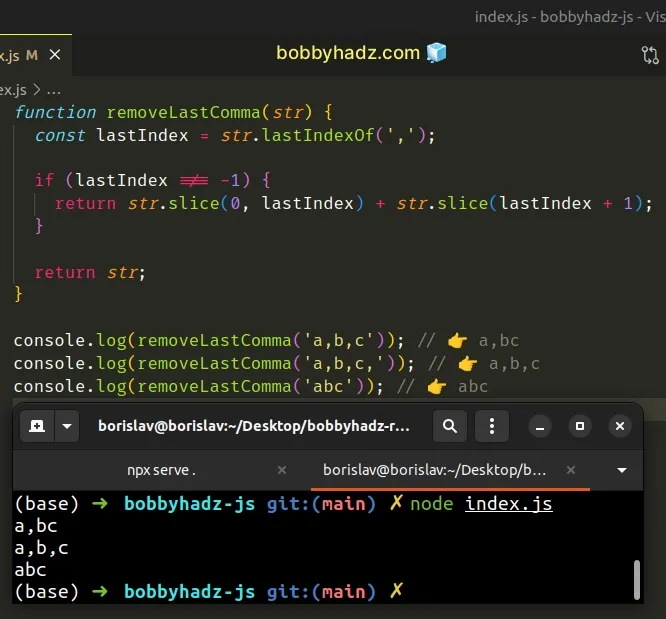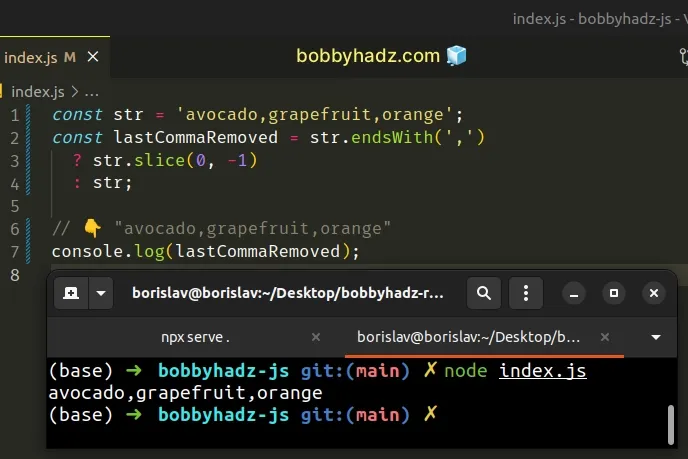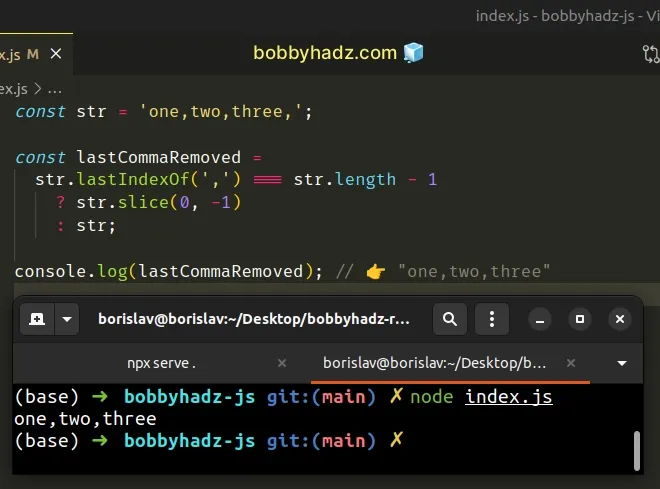Remove the last Comma from a String in JavaScript
Last updated: Mar 4, 2024
Reading time·8 min

# Table of Contents
- Remove the last Comma from a String in JavaScript
- Remove the last comma from a string regardless if it's at the end
- Remove the Leading and Trailing Comma from a String
- Removing multiple leading and trailing commas from a string
# Remove the last Comma from a String in JavaScript
Use the replace() method to remove the last comma from a string, e.g.
str.replace(/,*$/, '');.
The replace method will remove the last comma from the string by replacing
it with an empty string.
const str = 'apple,banana,kiwi,'; const lastCommaRemoved = str.replace(/,*$/, ''); console.log(lastCommaRemoved); // 👉️ "apple,banana,kiwi"

The String.replace() method returns a new string with one, some, or all matches of a regular expression replaced with the provided replacement.
The method takes the following parameters:
| Name | Description |
|---|---|
| pattern | The pattern to look for in the string. Can be a string or a regular expression. |
| replacement | A string used to replace the substring match by the supplied pattern. |
The forward slashes / / mark the beginning and end of the regular expression.
const str = 'apple,banana,kiwi,'; const lastCommaRemoved = str.replace(/,*$/, ''); console.log(lastCommaRemoved); // 👉️ "apple,banana,kiwi"
The asterisk * matches the preceding item (the comma) 0 or more times.
The dollar $ sign matches the end of the input.
In its entirety, the regular expression matches 0 or more commas at the end of the string.
This approach would also work if the string ends with multiple commas.
const str = 'apple,banana,kiwi,,,,,,'; const lastCommaRemoved = str.replace(/,*$/, ''); console.log(lastCommaRemoved); // 👉️ "apple,banana,kiwi"
If your string might also contain trailing whitespace after the comma that you
want to
remove, use the \s special character.
const str = 'one,two,three, '; const lastCommaRemoved = str.replace(/,\s*$/, ''); console.dir(lastCommaRemoved); // 👉️ 'one,two,three'
The \s special character matches spaces, tabs and new lines.
In its entirety, the regular expression matches one or more trailing commas and whitespace characters at the end of the string and then removes them by replacing them with an empty string.
If the string doesn't end with a comma (the regular expression doesn't match
anything), so the replace() method returns the entire string without removing
anything.
const str = 'apple,banana,kiwi'; const lastCommaRemoved = str.replace(/,*$/, ''); console.log(lastCommaRemoved); // 👉️ "apple,banana,kiwi"
The String.replace() method returns a new string with the matches of the
pattern replaced. The method doesn't change the original string.
Strings are immutable in JavaScript.
# Remove the last comma from a string regardless if it's at the end
If you need to remove the last comma from a string, regardless if it's at the
end of the string, use the String.lastIndexOf() method.
function removeLastComma(str) { const lastIndex = str.lastIndexOf(','); if (lastIndex !== -1) { return str.slice(0, lastIndex) + str.slice(lastIndex + 1); } return str; } console.log(removeLastComma('a,b,c')); // 👉️ a,bc console.log(removeLastComma('a,b,c,')); // 👉️ a,b,c console.log(removeLastComma('abc')); // 👉️ abc

The String.lastIndexOf() method returns the index of the last occurrence of a substring in a string.
The method returns -1 if the substring is not contained in the string.
If the string contains a comma, we use the String.slice() method to exclude
the character at that index, otherwise, we return the string as is.
This approach removes the last comma from the string even if it's not at the end.
Alternatively, you can use the String.endsWith() method.
# Remove the last Comma from a String using String.endsWith()
This is a three-step process:
- Use the
endsWith()method to check if the string ends with a comma. - If it does, use the
slice()method to get a portion of the string, excluding the last comma. - If it doesn't, return the string as is.
const str = 'avocado,grapefruit,orange'; const lastCommaRemoved = str.endsWith(',') ? str.slice(0, -1) : str; // 👇️ "avocado,grapefruit,orange" console.log(lastCommaRemoved);

The String.endsWith() method returns true if the string ends with the
specified substring and false otherwise.
The ternary operator is
very similar to an if/else statement.
If the expression to the left of the question mark is truthy, the operator returns the value to the left of the colon, otherwise, the value to the right of the colon is returned.
If the string ends with a comma, we use the slice() method to get a new string
excluding the last character of the original string.
The String.slice() method can be passed negative indexes to count backward.
console.log('bobbyhadz.com'.slice(0, -1)); // 👉️ bobbyhadz.co console.log('bobbyhadz.com'.slice(0, -2)); // 👉️ bobbyhadz.c
If the string doesn't end with a comma, we return it as is.
The String.slice() method extracts a section of a string and returns it, without modifying the original string.
The String.slice() method takes the following arguments:
| Name | Description |
|---|---|
| start index | The index of the first character to include in the returned substring |
| end index | The index of the first character to exclude from the returned substring |
Passing an end index of -1 and str.length - 1 is the same.
We instruct the slice() method to go up to, but not including the last
character of the string.
This approach only removes the last comma from the string.
It doesn't handle a scenario where the string ends with multiple commas. If you need to handle that, use the regex approach instead.
Alternatively, you can use the String.lastIndexOf method.
# Remove the last Comma from a String using lastIndexOf
This is a three-step process:
- Use the
lastIndexOf()method to check if the last character in the string is a comma. - If it is, use the
slice()method to exclude the last character. - If it isn't, return the string as is.
const str = 'one,two,three,'; const lastCommaRemoved = str.lastIndexOf(',') === str.length - 1 ? str.slice(0, -1) : str; console.log(lastCommaRemoved); // 👉️ "one,two,three"

We used the lastIndexOf() method to check if the last character in the string
is a comma.
If the condition is met, we return the result of calling the str.slice()
method and remove the last comma from the string.
Otherwise, we return the entire string without removing anything.
# Remove the Leading and Trailing Comma from a String
To remove the leading and trailing comma from a string, call the replace()
method with a regular expression that matches a comma at the start and end of
the string.
The method will remove the leading and trailing comma from the string by replacing them with empty strings.
const str = ',bobby,hadz,com,'; // ✅ Remove leading and trailing comma from a string const result = str.replace(/(^,)|(,$)/g, ''); console.log(result); // 👉️ "bobby,hadz,com"
The String.replace() method returns a new string with one, some, or all matches of a regular expression replaced with the provided replacement.
The method takes the following parameters:
| Name | Description |
|---|---|
| pattern | The pattern to look for in the string. Can be a string or a regular expression. |
| replacement | A string used to replace the substring match by the supplied pattern. |
The forward slashes / / mark the beginning and end of the regular expression.
const str = ',bobby,hadz,com,'; const result = str.replace(/(^,)|(,$)/g, ''); console.log(result); // 👉️ "bobby,hadz,com"
The caret ^ matches the beginning of the input and the dollar sign $ matches
the end of the input.
| (OR) special character to match a comma at the beginning or a comma at the end of the string.We used the g (global) flag to match not just the first occurrence (the comma
in the beginning), but also the comma at the end of the string.
# Removing multiple leading and trailing commas from a string
If your string might contain multiple leading and trailing commas, use the plus
+ special character.
const str = ',,,bobby,hadz,com,,,'; // ✅ Remove leading and trailing comma from a string const result = str.replace(/(^,+)|(,+$)/g, ''); console.log(result); // 👉️ "bobby,hadz,com"
The plus + matches the preceding item (leading or trailing commas) 1 or more
times.
If the string contains no leading or trailing commas, the replace method returns a copy of the string.
const str = 'bobby,hadz,com'; const result = str.replace(/(^,+)|(,+$)/g, ''); console.log(result); // 👉️ "bobby,hadz,com"
If you have to do this often, define a reusable function.
function removeLeadingTrailingComma(str) { return str.replace(/(^,+)|(,+$)/g, ''); } // 👇️ bobby,hadz console.log(removeLeadingTrailingComma(',bobby,hadz,')); // 👇️ bobby,hadz,com console.log(removeLeadingTrailingComma(',bobby,hadz,com,'));
The function takes a string as a parameter and removes the leading and trailing commas from the string.
The String.replace() method returns a new string with the matches of the
pattern replaced. The method doesn't change the original string.
Strings are immutable in JavaScript.
# Removing the leading and trailing comma from string using startsWith
This is a three-step process:
- Use the
startsWith()method to check if the string starts with a comma. - Use the
endsWith()method to check if the string ends with a comma. - If the conditions are met, use the
slice()method to remove the leading and trailing comma.
function removeLeadingTrailingComma(str) { if (str.startsWith(',') && str.endsWith(',')) { return str.slice(1, -1); } if (str.startsWith(',')) { return str.slice(1); } if (str.endsWith(',')) { return str.slice(0, -1); } return str; } // 👇️ "bobby,hadz,com" console.log(removeLeadingTrailingComma(',bobby,hadz,com,')); // 👇️ "bobby,hadz,com" console.log(removeLeadingTrailingComma('bobby,hadz,com,')); // 👇️ "bobby,hadz,com" console.log(removeLeadingTrailingComma(',bobby,hadz,com')); // 👇️ "bobby,hadz,com" console.log(removeLeadingTrailingComma('bobby,hadz,com'));
We handle multiple scenarios:
- The string contains both a leading and a trailing comma.
- The string contains only a leading comma.
- The string contains only a trailing comma.
- The string contains no leading or trailing commas.
The
String.startsWith()
method returns true if the string starts with the specified substring and
false otherwise.
const str = ',bobby,hadz,com'; console.log(str.startsWith(',')); // 👉️ true console.log(str.endsWith(',')); // 👉️ false
The String.endsWith method returns true if the string ends with the
specified substring and false otherwise.
The String.slice() method extracts a section of a string and returns it, without modifying the original string.
The String.slice() method takes the following arguments:
| Name | Description |
|---|---|
| start index | The index of the first character to include in the returned substring |
| end index | The index of the first character to exclude from the returned substring |
When only a single argument is passed to the String.slice() method, the slice
goes to the end of the string.
The String.slice() method can be passed negative indexes to count backward.
const str = 'bobbyhadz.com'; console.log(str.slice(0, -1)); // 👉️ bobbyhadz.co
Passing an end index parameter of -1 and string.length - 1 is the same.
We instruct the slice method to go up to, but not including the last character
in the string.
The function checks if the string starts with a comma and if it does, it strips the leading and trailing commas.
function removeLeadingTrailingComma(str) { if (str.startsWith(',') && str.endsWith(',')) { return str.slice(1, -1); } if (str.startsWith(',')) { return str.slice(1); } if (str.endsWith(',')) { return str.slice(0, -1); } return str; }
If the string starts with a comma but doesn't end with one, the function removes the leading comma.
If the string ends with a comma but doesn't start with one, the function removes the trailing comma.
If the string doesn't start with or end with a comma, the function returns the entire string without removing anything.
# Additional Resources
You can learn more about the related topics by checking out the following tutorials:

